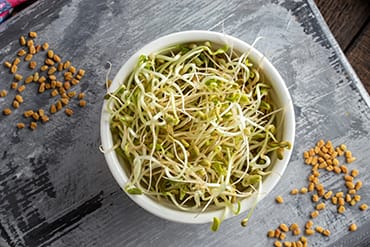Sprouting Seeds
All our sprouting seeds are 100% organic and Soil Association certified. We’ve been growing and selling sprouting seed since 1984. Start your sprouting journey today.
Free delivery over £40 & no quibble returns.
Whether an expert sprout grower or a beginner, we’re always on hand to help.

Showing all 29 results
Showing all 29 results
Frequently Asked Questions
What Are Sprouting Seeds?
Sprouting seeds are seeds that have been germinated and are about to grow into a new plant. They are popular in home gardening and are known for their health benefits. Sprouting seeds include varieties like alfalfa, radish, broccoli, mung bean, and wheatgrass. They are easy to grow indoors, requiring minimal space and equipment.
What Equipment Do I Need to Start Sprouting Seeds at Home?
The basic equipment for sprouting seeds at home includes a sprouting jar or tray, and clean, fresh water. Sprouting jars are typically glass jars with a mesh lid for easy rinsing and draining. Trays are useful for larger quantities. No soil or sunlight is required, making it an accessible activity for most people.
How Long Does It Take for Sprouting Seeds to Germinate?
The germination time for sprouting seeds varies depending on the type of seed. Most seeds start sprouting within 24-48 hours, with a total growing time ranging from 3 to 7 days. Some seeds, like alfalfa, are quicker to sprout, while others, like chickpeas, may take longer.
How Should I Store Sprouting Seeds?
Store unsprouted seeds in a cool, dry, dark place to maintain their viability. After sprouting, keep the sprouts in the refrigerator, ideally in a container that allows for air circulation. Consume them within a week for best taste and nutritional value.
What Are the Health Benefits of Eating Sprouted Seeds?
Sprouted seeds are rich in nutrients, including vitamins, minerals, proteins, and enzymes. The sprouting process increases the bioavailability of these nutrients, making them easier for the body to absorb. They are also low in calories and high in fiber, making them a healthy addition to any diet.























































